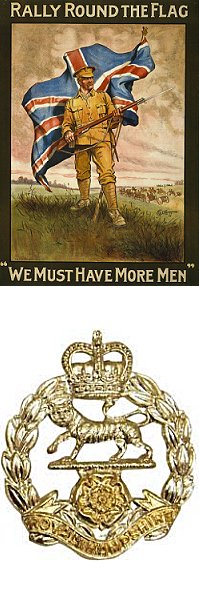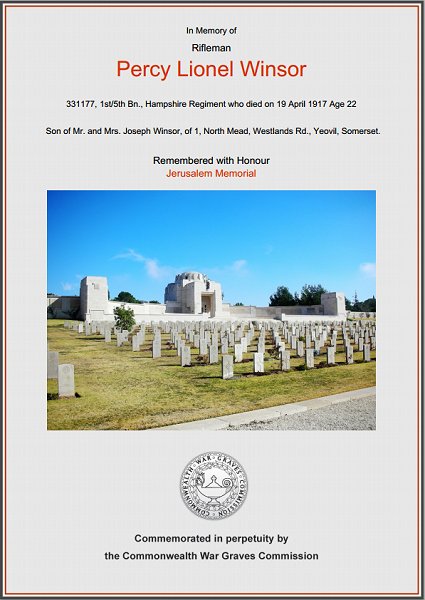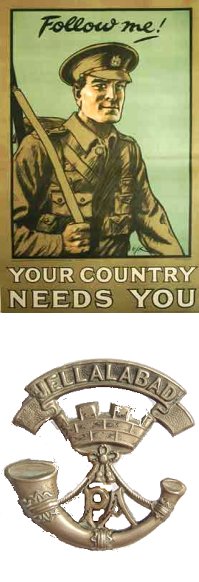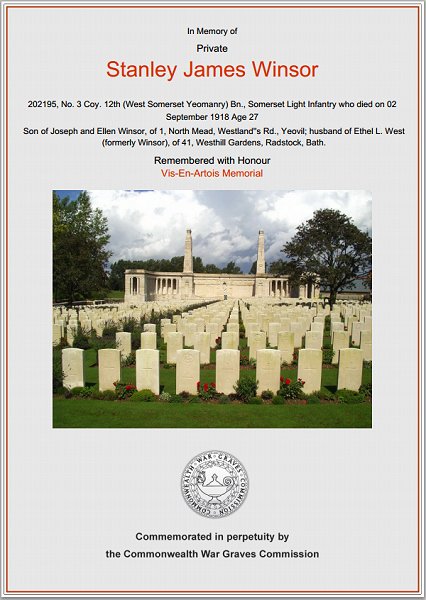yeovil at war
Stanley and Percy Winsor
Yeovil brothers killed during the First World War
Joseph Winsor was born in Yeovil in 1857, the son of leather glover George Winsor and his wife Sarah. Joseph was the fifth of six children and the 1861 census found the family living in Bond Street. The family were still in Bond Street in the 1871 census but by this time there were another three children. 14-year old Joseph listed his occupation as a baker.
In the winter of 1878 Joseph married Ellen Ewens and altogether Joseph and Ellen were to have eight children; Frederick W (b 1881), Arthur G (b 1883), Ernest G (b 1885), Reginald Joseph (b 1889), Earle Samuel (b 1889), Stanley James (b 1891), Percy Lionel (b 1894) and another child who died in infancy. In the 1881 census they were living in Park Street with their two-month old son Frederick and Joseph's brother Albert. Joseph gave his occupation as a glove cutter, Ellen as a glover and Albert was a blacksmith.
By 1891 Joseph and Ellen were living in Ebenezer Row, Middle Street (where Poundland is today) with five of their sons (Fred, Arthur, Ernest, Reginald and Earle) and a 14-year old servant girl. Joseph was still employed as a glove cutter. By 1901 the family had moved yet again and were living in Beer Street. By this time Fred had left home and Joseph and his two eldest sons, Arthur and Ernest, were all employed as glove cutters. 9-year old Stanley and 6-year old Percy were listed for the first time.
In the 1911 census the family were listed at 63 Beer Street. By this time 54-year old Joseph and 51-year old Ellen had been married for 33 years. Living with them were the twins, Reginald and Earle, a bread baker and a pastry baker respectively, and Percy who worked as a tailor. By this time Joseph stated his occupation as 'Leather Glove Cutter (Foreman)'. Stanley, in the meantime, was living in Poole, Dorset, with the family of Herbert Berrill, a hairdresser and tobacconist. Stanley listed his occupation as a hairdresser's assistant.
On 28 July 1914 the First World War started and four of Joseph and Ellen's sons were destined to fight in the war. Details of all the brothers' enlistments are unknown, but Percy enlisted in January 1916 and Stanley enlisted at about the same time.
Men had a choice over the regiment they were assigned to and before the war would typically join the army for a period of 7 years full time service with the colours, to be followed by another 5 in the Army Reserve. However in August 1914 a new form of "short service" was introduced, under which a man could serve for "three years or the duration of the war, whichever the longer". Percy joined the 1st/5th Battalion, Hampshire Regiment and Stanley joined 12th Battalion, Somerset Light Infantry - both Territorial units.
![]()
Rifleman Percy Lionel Winsor
 The
records indicate
that Joseph and
Ellen's youngest
son Percy
joined 1st/5th
Battalion,
Hampshire
Regiment in
January 1916 as
Rifleman, No
331177. This
unit, a
Territorial
force, which was
part of the
Hampshire
Brigade in the
Wessex Division,
was formed in
Southampton in
August 1914 and
sailed on 9
October 1914 for
India. Landing
at Karachi on 11
November 1914,
the battalion
remained in
India for the
rest of the war.
The
records indicate
that Joseph and
Ellen's youngest
son Percy
joined 1st/5th
Battalion,
Hampshire
Regiment in
January 1916 as
Rifleman, No
331177. This
unit, a
Territorial
force, which was
part of the
Hampshire
Brigade in the
Wessex Division,
was formed in
Southampton in
August 1914 and
sailed on 9
October 1914 for
India. Landing
at Karachi on 11
November 1914,
the battalion
remained in
India for the
rest of the war.
The 1st/5th Battalion, Hampshire Regiment, was formed in September 1914 as a home service, that is a 'second line' unit, which became part of the 2nd/1st Hampshire Brigade in 2nd Wessex Division. It too sailed to India in December 1914.
Enlisting in March 1916, Percy would have sailed to India to join his unit, the 1st/5th. It is most likely however that he was later attached to the 2nd/5th Battalion which left India on 29 April 1917 and sailed for Egypt. The Battalion arrived at Ismailia, in north-eastern Egypt, on 5 April 1917 and was attached to 232nd Brigade in 75th Division.
This 75th Division was created during the war. On 16 March 1917 the War Office gave permission to General Officer Commanding the Egyptian Expeditionary Force, Sir Edmund Allenby, permission to form a new Division from the units of the Territorial Force which were now arriving from India.
On 21 May further instructions were given that the three infantry brigades should incorporate Indian battalions; this was augmented on 11 June by instructions that each brigade should have three Indian battalions and one British. It was, strictly, a Division of the Territorial Force but 'Indianised' to a great extent.
At the outbreak of the First World War, Palestine (now Israel) was part of the Turkish Empire and it was not entered by Allied forces until December 1916. The advance to Jerusalem took a further year. No 331177, Rifleman Percy Lionel Winsor was killed on 19 April 1917, aged 22.
|
A
letter
published
in the
Western
Gazette,
16
October
1914
Private
Percy
Winsor
who is
with the
Dorset
Regiment,
writing
home to
his
parents,
Mr and
Mrs
Chas.
Winsor
of 7
Woodland
Grove
states:
“I had a
bit of a
surprise
them out
all week
ago.
I
heard
someone
asking
for
Winsor.
I
said
hello
and it
turned
out to
be Fred
Pendleton.
He is a
Sergeant
and is
well
liked in
his
Company.
Young
Pike
from Pen
Mill was
wounded
at Mons
[he
was
actually
killed],
also
Lewis,
the
policeman.
There
are
Sharpe,
Morgan,
Sandford
(the
postman),
a chap
named
Rowsell,
Sergeant
Gaylard
(Drum
Major)
and
myself,
Yeovil
chaps
here.”
In a
further
letter
dated
October
16 he
says:
“Since
writing
last we
had been
in the
thickest
of it
and it
has been
a
terrible
time.
We were
at the
Aisne
for 14
days,
and then
we had
to go in
and
relieve
the left
flank
and got
stuck
into it
before
we knew
what was
happening.
God
knows it
has been
a
terrible
ordeal;
we
barely
have
only
half our
Regiment
left.
It has
been
heart-rending
to the
strongest.
Anyhow
we have
managed
to stop
their
advance
although
we
suffered.”
Priv.
Percy
Winsor,
has been
admitted
to
Lancaster
Hospital
suffering
from a
slight
wound in
his neck
and
acute
rheumatism.
Writing
to his
parents
Mr and
Mrs C
Winsor,
Woodland
Grove,
he says:
“My neck
is going
on fine.
This is
a
Temporary
Hospital,
and it
is run
by the
British
Red
Cross
Society
and we
get
every
possible
attention
here.
There
are 20
British
soldiers
here and
30
Belgian.
I
reported
sick on
3
November
and was
admitted
to the
Boulogne
Hospital
on the
fourth.
We were
in
billets
last
Sunday
week and
hoped to
have a
few days
rest
outside
Hazelbruck.
Just as
we were
warming
some
bully
and
spuds at
about
half-past
one, we
had a
sudden
move and
got on
the
motors
straight
into the
thick of
it again
about 30
miles to
the left
front of
Hazelbruck.
On the
next
morning
we gave
them a
bit of
cold
steel,
that’s
what
they
can’t
stick at
any
price.
Our
chaps
are
always
ready
for a
charge,
it is a
treat to
see them
doing a
sprint
all in
confusion,
but the
greatest
sport is
to go
out
’sniping’
to try
to draw
their
fire.
It is
better
than
rabbit
shooting,
but of
course
sometimes
we have
got to
run
ourselves.
Well I
can
safely
say that
if they
don’t
send me
out
again I
have
done my
bit and
am proud
of what
I have
done.
If I go
back I
hope to
be able
to do
the same
again.
Some of
their
shells
are far
inferior
to what
they
were and
I have
counted
from as
many as
15 to 20
have
been
fired
and not
burst.
The
swines
are
using
dum dum
bullets.
There is
a chap
here
next to
me with
the palm
of his
hand
blown
away
with one
of them.
Another
one of
theirs
is for
two or
three to
advance
with the
flag
making
out if
they
want to
surrender,
and as
soon as
the
party go
out to
take
some
prisoners
they lie
down and
fire at
our
chaps
from the
trenches.
That’s
why we
have
lost so
many
officers
that the
order is
now to
take no
notice
of any
flags
and get
as many
rounds
at them
as we
can.” In
another
letter
Private
Winsor
says:
“With
regard
to poor
Ted
Pendleton
(his
chum), I
saw him
on 10
October
(before
we went
into
action
at La
Bassee)
and I
have not
seen him
since.
We have
lost a
big
percentage
of our
officers
and men.
I
must
consider
myself
lucky as
I have
had a
few
narrow
escapes
from
bursting
shells.”
from
"Letters
home to
Yeovil
in the
Great
War,
1914 –
1919"
by Jack
Sweet |
On 18 May 1917 the Western Gazette reported "Mr and Mrs J Winsor, of Brunswick Street, have been informed that their youngest son, Percy, is missing after an engagement in the East on April 14th. He joined up fifteen months ago, and for 12 months had been in Egypt. He was 22 years of age and has three brothers in the Army."
On 13 July 1917 the Western Gazette reported "Mr and Mrs Winsor, of Brunswick Street, have received official information that their son, Priv. Percy Winsor, is believed to have been killed. As reported in the “Western Gazette” a few weeks since, he was previously reported as missing. Priv. Winsor enlisted in January 1916, and after the usual training embarked for Egypt. Much sympathy is felt for the deceased’s relatives and friends."
Percy Winsor is commemorated on Panels 28 and 29 of the Jerusalem Memorial in the Jerusalem War Cemetery. The Jerusalem Memorial commemorates 3,300 British and Commonwealth servicemen who died during the First World War in operations in Egypt or Palestine and who have no known grave.
Percy Winsor's name is also on the Yeovil War Memorial in the Borough.
The 75th Division later took the field in time for the Third Battle of Gaza and remained in action in Palestine, taking part in the Third Battle of Gaza (27 October-7 November 1917, including the Capture of Gaza on 6-7 November), the Capture of Junction Station (13-14 November 1917) and the Battle of Nabi Samweil (20-24 November 1917). The 2/5th Battalion, the Hampshire Regiment, was disbanded by 13 August 1918.

The Commonwealth War Graves Commission certificate in memory of Percy Winsor.
![]()
Private Stanley James Winsor
 Stanley
James Winsor joined
the Somerset
Light Infantry
in early 1916 as
Private, No
202195.
He was later to
serve in No 3
Company, 12th
Battalion but it
is most likely
that he enlisted
into either the
1st/5th
Battalion or the
2nd/4th
Battalion - both
Territorial
battalions of
the Somerset
Light Infantry -
since these were
the only
Somerset Light
Infantry units
in Egypt prior
to the formation
of the 12th
Battalion.
Stanley
James Winsor joined
the Somerset
Light Infantry
in early 1916 as
Private, No
202195.
He was later to
serve in No 3
Company, 12th
Battalion but it
is most likely
that he enlisted
into either the
1st/5th
Battalion or the
2nd/4th
Battalion - both
Territorial
battalions of
the Somerset
Light Infantry -
since these were
the only
Somerset Light
Infantry units
in Egypt prior
to the formation
of the 12th
Battalion.
The 12th (West Somerset Yeomanry) Battalion was a Territorial battalion of the Somerset Light Infantry formed at Ismailia in Egypt on 4 January 1917 from a dismounted yeomanry regiment. On 14 January 1917 the General Officer Commanding the Egyptian Expeditionary Force, Sir Edmund Allenby, gave orders for the reorganisation of the 2nd, 3rd and 4th Dismounted Brigades of Yeomanry - at the time all were serving on Suez Canal defences - and for their conversion and re-designation as the 229th (including the 12th Battalion, Somerset Light Infantry), 230th and 231st Infantry Brigades. These Brigades were organised as a Division, which began to assemble on 4 March 1917 near El Arish. It was, strictly, a Division of the Territorial Force. The Divisional artillery did not join until July, by which time the Division had already taken part in its first action, the Second Battle of Gaza.
It remained in action in Palestine until April 1918, taking part in the following engagements:
-
The Second Battle of Gaza (17-19 April 1917)
-
The Third Battle of Gaza (27 October-7 November 1917, including the capture of Beersheba on 31 October and the capture of the Sheria Position on 6 November)
-
The capture of Jerusalem (8-9 December 1917)
-
The Defence of Jerusalem (27-30 December 1917)
-
The Battle of Tell'Asur (8-12 March 1918)
On 3 March 1918 the Division received a warning order to prepare to leave Palestine and move to France. It was relieved on 7-9 March and marched back to Lydda. Here the artillery was reorganised, a pioneer battalion joined and the machine gun battalion was formed. On 14 April Divisional HQ moved to Kantara, followed by the rest of the units.
Embarkation began at Alexandria on 29 April. The first units landed at Marseilles on 7 May 1918 and entrained for the north. Concentration was completed in the area of Rue (near Abbeville) by 18 May. Training for unfamiliar operations, notably gas defence, was undertaken before toward the end of May when the units moved to the Doullens - St Pol area.
On 14 July the Division took over a sector of front line near Merville and then remained in France and Flanders for the rest of the war, taking part in the Second Battle of the Somme, also known as the Second Battle of Bapaume, On 2-3 September 1918. Private Stanley James Winsor was killed on the first day of this action. He was aged 27.
On 4 October 1918 the Western Gazette reported "Mr and Mrs J Winsor, of Homeleigh, Brunswick Street, have again been bereaved by the loss of a son who has fallen in the war. They received notice this week that their sixth son, Private Stanley J Winsor, of the Somerset L.I. was killed in action on September 2nd. Twenty seven years of age, Private Winsor had been in the Army about two and a half years. Before joining up he was employed by Mr H Hatt (the Mayor of Bath), having previously served an apprenticeship with Mr Membury, of Middle Street."
Stanley Winsor is commemorated on the Vis-en-Artois Memorial in the Vis-en-Artois British Cemetery, Pas de Calais, France. The Memorial bears the names of over 9,000 men who fell in the period from 8 August 1918 to the date of the Armistice in the Advance to Victory in Picardy and Artois, between the Somme and Loos, and who have no known grave. They belonged to the forces of Great Britain and Ireland and South Africa.
Stanley Winsor's name is also on the Yeovil War Memorial in the Borough, with his brother's.
After his death, Stanley's unit took part in the Battles of the Hindenburg Line (the Battle of Epehy, 18 September 1918, and the Final Advance in Artois and Flanders. The Division crossed the Scheldt on 9 November and two days later the advanced units crossed the Dendre (Dender) Canal. When the Armistice came into effect they had occupied Ath. Five days later the Division moved to the area Rebaix - Herinnes - Tournai, and work was carried out on repairing the Tournai-Leuze railway. King George V visited the Division on 7 December 1918. Although demobilisation took place principally in the first months of 1919, Divisional HQ was kept in operation near Lessines until 10 July 1919.

The Commonwealth War Graves Commission certificate in memory of Stanley Winsor.